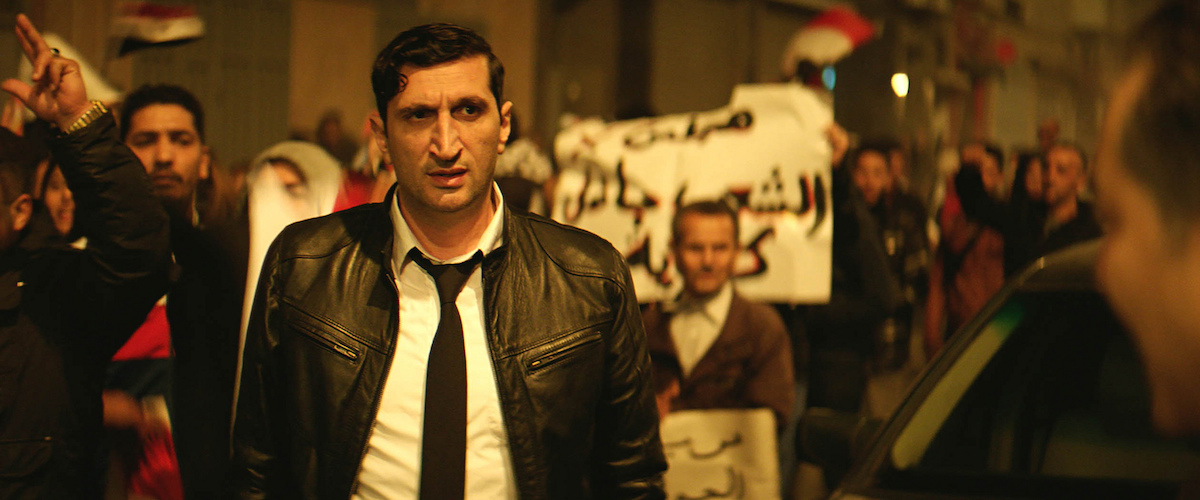“The Nile Hilton Incident” is a political thriller based on a true story, but it needs the real life context to give it some energy (usually, it’s the other way around). As a story that you might find at an airport bookstore, it hits a lot of familiar beats: a lone investigator who smokes so many cigarettes he could give a Disney movie an R-rating; the murder of a beautiful person; a potential political scandal that starts with corruption; a corrupt police force who get in the way of the investigator; people in the shadows, either witnesses or killers, to help motivate the investigation into the central murder.
In this tale, a Sudanese refugee working as a maid witnesses the murder of a pop star, which might have been committed by an Egyptian diplomat. It’s up to investigator Noredin (Fares Fares) to make sense of the crime scene and its silent witness, while going up against a police force that does the opposite of help him.
Director Tarik Saleh follows narrative procedure at a slow burn—too slow of a burn—and the story fails to resonate aside from its finale. As the story is set in Cairo in January 2011, the movie’s events lead up to the January 25 revolution, where many of the ugly components listed above played out in reality. The historical context does make for a gripping final shot in this movie, showing the expansive protests against President Mubarak. It has the feel of a American thriller from the 1970s, like “The Parallax View,” packing in elements of corruption and paranoia. But “The Nile Hilton” doesn’t succeed unless its aim is to recognize national history by means of familiar filmmaking.

“Don’t Swallow My Heart, Alligator Girl!” is an entry from Brazil that tries to breathe life into a timeless concept, the division between two lands and the people whose lives are put at stake because of it. The setting is the border of Brazil and Paraguay, where violence between the countries has been an issue for years, the hatred ingrained in their lives, communities and in this film’s case, motorcycle races. But the young Joca doesn’t care about this as he pursues Basano (Adeli Benitez), a girl with alligator tattoos, a stick and a sense of power. Director Felipe Bragança illustrates this with innocence and naiveté, his desire to win her affection is less cute than tragic. The coldness she reacts to him matched with extreme wide shots (a tedious festival commonality) of him chasing her through a field, etc.
Meanwhile, Joca’s brother Fernando (Cauã Reymond) is involved in a motorcycle gang (called the Calendar Gang) straight out of a Nicolas Winding Refn rough draft. They race against Paraguayans, including Basano’s overly affectionate cousin Alberto (Mario Verón). Eventually the peace between the two groups starts to dissipate, especially as bodies start to float down the nearby Apa River. Like with Joca’s story, Fernando’s path starts off interesting but only gets so far with that initial momentum. Fernando’s plot, however, does boast the performance of Reymond, who has a raw, tragic machismo as Fernando falls into key positions he does not seem to want: man of the house and the most important member of the gang, second to its leader.
Bragança knows where to put a camera and how to get arresting visuals from both of his stories. There are a handful of images that will last long after the story has faded, like a car in the background driving straight towards Basano on an empty road (she is dragging an alligator, of course). Even the narrative idea of using motorcycle races is an intriguing visual to depict Paraguayans and Brazilians clashing, far more interesting than Joca and Basano’s respective parts standing contemptuously on other sides of the river. The score too, which is synth driven and adds even more to those Refn inklings, is a strong touch. But even the metaphor within the movie’s verbose title is executed not literally but still without clarity.
Composed as the film may be, Bragança’s choice of a slicker style instead of gritty one makes the narrative hard to connect with. Motorcycle scenes with Fernando lack the desired sense of danger, despite the way many bikes are shown riding at night, in rough-housing races. The same goes for scenes of eventual romance, with Joca and Basano in scenes straight from a fairy tale, like a moment in the river, (with a heavy, hammy tint of blue) as fireflies surround them. As the story works visually but becomes emotionally incomprehensive, Bragança proves that he’s far more of a filmmaker than a storyteller.












